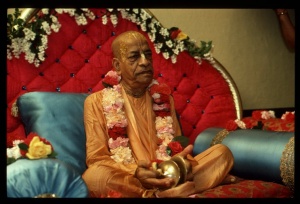CC Madhya 21.106: Difference between revisions
m (1 revision(s)) |
(Vanibot #0054 edit - transform synonyms into clickable links, which search similar occurrences) |
||
| (One intermediate revision by one other user not shown) | |||
| Line 1: | Line 1: | ||
{{ | [[Category:Sri Caitanya-caritamrta - Madhya-lila Chapter 21|C106]] | ||
<div style="float:left">'''[[Sri Caitanya-caritamrta|Śrī Caitanya-caritāmṛta]] - [[CC Madhya|Madhya-līlā]] - [[CC Madhya 21|Chapter 21: The Opulence and Sweetness of Lord Śrī Kṛṣṇa]]'''</div> | |||
<div style="float:right">[[File:Go-previous.png|link=CC Madhya 21.105|Madhya-līlā 21.105]] '''[[CC Madhya 21.105|Madhya-līlā 21.105]] - [[CC Madhya 21.107|Madhya-līlā 21.107]]''' [[File:Go-next.png|link=CC Madhya 21.107|Madhya-līlā 21.107]]</div> | |||
{{CompareVersions|CC|Madhya 21.106|CC 1975|CC 1996}} | |||
{{RandomImage}} | |||
==== TEXT 106 ==== | ==== TEXT 106 ==== | ||
<div | <div class="verse"> | ||
brahmāṇḍopari paravyoma, tāhāṅ ye svarūpa-gaṇa, | :brahmāṇḍopari paravyoma, tāhāṅ ye svarūpa-gaṇa, | ||
tāṅ-sabāra bale hare mana | :tāṅ-sabāra bale hare mana | ||
pati-vratā-śiromaṇi, yāṅre kahe veda-vāṇī, | :pati-vratā-śiromaṇi, yāṅre kahe veda-vāṇī, | ||
ākarṣaye sei lakṣmī-gaṇa | :ākarṣaye sei lakṣmī-gaṇa | ||
</div> | </div> | ||
| Line 14: | Line 18: | ||
==== SYNONYMS ==== | ==== SYNONYMS ==== | ||
<div | <div class="synonyms"> | ||
brahmāṇḍa- | ''[//vanipedia.org/wiki/Special:VaniSearch?s=brahmāṇḍa&tab=syno_o&ds=1 brahmāṇḍa]-[//vanipedia.org/wiki/Special:VaniSearch?s=upari&tab=syno_o&ds=1 upari]'' — above all the universes; ''[//vanipedia.org/wiki/Special:VaniSearch?s=para&tab=syno_o&ds=1 para]-[//vanipedia.org/wiki/Special:VaniSearch?s=vyoma&tab=syno_o&ds=1 vyoma]'' — the spiritual sky; ''[//vanipedia.org/wiki/Special:VaniSearch?s=tāhāṅ&tab=syno_o&ds=1 tāhāṅ]'' — there; ''[//vanipedia.org/wiki/Special:VaniSearch?s=ye&tab=syno_o&ds=1 ye]'' — all those; ''[//vanipedia.org/wiki/Special:VaniSearch?s=svarūpa&tab=syno_o&ds=1 svarūpa]-[//vanipedia.org/wiki/Special:VaniSearch?s=gaṇa&tab=syno_o&ds=1 gaṇa]'' — transcendental personal expansions; ''[//vanipedia.org/wiki/Special:VaniSearch?s=tāṅ&tab=syno_o&ds=1 tāṅ]-[//vanipedia.org/wiki/Special:VaniSearch?s=sabāra&tab=syno_o&ds=1 sabāra]'' — of all of Them; ''[//vanipedia.org/wiki/Special:VaniSearch?s=bale&tab=syno_o&ds=1 bale]'' — by force; ''[//vanipedia.org/wiki/Special:VaniSearch?s=hare&tab=syno_o&ds=1 hare] [//vanipedia.org/wiki/Special:VaniSearch?s=mana&tab=syno_o&ds=1 mana]'' — it enchants the minds; ''[//vanipedia.org/wiki/Special:VaniSearch?s=pati&tab=syno_o&ds=1 pati]-[//vanipedia.org/wiki/Special:VaniSearch?s=vratā&tab=syno_o&ds=1 vratā]'' — of those who are chaste and devoted to the husband; ''[//vanipedia.org/wiki/Special:VaniSearch?s=śiromaṇi&tab=syno_o&ds=1 śiromaṇi]'' — topmost; ''[//vanipedia.org/wiki/Special:VaniSearch?s=yāṅre&tab=syno_o&ds=1 yāṅre]'' — unto whom; ''[//vanipedia.org/wiki/Special:VaniSearch?s=kahe&tab=syno_o&ds=1 kahe]'' — describe; ''[//vanipedia.org/wiki/Special:VaniSearch?s=veda&tab=syno_o&ds=1 veda]-[//vanipedia.org/wiki/Special:VaniSearch?s=vāṇī&tab=syno_o&ds=1 vāṇī]'' — hymns of the ''Vedas''; ''[//vanipedia.org/wiki/Special:VaniSearch?s=ākarṣaye&tab=syno_o&ds=1 ākarṣaye]'' — it attracts; ''[//vanipedia.org/wiki/Special:VaniSearch?s=sei&tab=syno_o&ds=1 sei]'' — those; ''[//vanipedia.org/wiki/Special:VaniSearch?s=lakṣmī&tab=syno_o&ds=1 lakṣmī]-[//vanipedia.org/wiki/Special:VaniSearch?s=gaṇa&tab=syno_o&ds=1 gaṇa]'' — all the goddesses of fortune. | ||
</div> | </div> | ||
| Line 21: | Line 25: | ||
==== TRANSLATION ==== | ==== TRANSLATION ==== | ||
<div | <div class="translation"> | ||
“The beauty of Kṛṣṇa’s body is so attractive that it attracts not only the demigods and other living entities within this material world but the personalities of the spiritual sky as well, including the Nārāyaṇas, who are expansions of Kṛṣṇa’s personality. The minds of the Nārāyaṇas are thus attracted by the beauty of Kṛṣṇa’s body. In addition, the goddesses of fortune [Lakṣmīs], who are the wives of the Nārāyaṇas and are the women described in the Vedas as most chaste, are also attracted by the wonderful beauty of Kṛṣṇa. | “The beauty of Kṛṣṇa’s body is so attractive that it attracts not only the demigods and other living entities within this material world but the personalities of the spiritual sky as well, including the Nārāyaṇas, who are expansions of Kṛṣṇa’s personality. The minds of the Nārāyaṇas are thus attracted by the beauty of Kṛṣṇa’s body. In addition, the goddesses of fortune [Lakṣmīs], who are the wives of the Nārāyaṇas and are the women described in the Vedas as most chaste, are also attracted by the wonderful beauty of Kṛṣṇa. | ||
</div> | </div> | ||
__NOTOC__ | |||
<div style="float:right; clear:both;">[[File:Go-previous.png|link=CC Madhya 21.105|Madhya-līlā 21.105]] '''[[CC Madhya 21.105|Madhya-līlā 21.105]] - [[CC Madhya 21.107|Madhya-līlā 21.107]]''' [[File:Go-next.png|link=CC Madhya 21.107|Madhya-līlā 21.107]]</div> | |||
__NOTOC__ | |||
__NOEDITSECTION__ | |||
Latest revision as of 22:47, 19 February 2024

A.C. Bhaktivedanta Swami Prabhupada
TEXT 106
- brahmāṇḍopari paravyoma, tāhāṅ ye svarūpa-gaṇa,
- tāṅ-sabāra bale hare mana
- pati-vratā-śiromaṇi, yāṅre kahe veda-vāṇī,
- ākarṣaye sei lakṣmī-gaṇa
SYNONYMS
brahmāṇḍa-upari — above all the universes; para-vyoma — the spiritual sky; tāhāṅ — there; ye — all those; svarūpa-gaṇa — transcendental personal expansions; tāṅ-sabāra — of all of Them; bale — by force; hare mana — it enchants the minds; pati-vratā — of those who are chaste and devoted to the husband; śiromaṇi — topmost; yāṅre — unto whom; kahe — describe; veda-vāṇī — hymns of the Vedas; ākarṣaye — it attracts; sei — those; lakṣmī-gaṇa — all the goddesses of fortune.
TRANSLATION
“The beauty of Kṛṣṇa’s body is so attractive that it attracts not only the demigods and other living entities within this material world but the personalities of the spiritual sky as well, including the Nārāyaṇas, who are expansions of Kṛṣṇa’s personality. The minds of the Nārāyaṇas are thus attracted by the beauty of Kṛṣṇa’s body. In addition, the goddesses of fortune [Lakṣmīs], who are the wives of the Nārāyaṇas and are the women described in the Vedas as most chaste, are also attracted by the wonderful beauty of Kṛṣṇa.